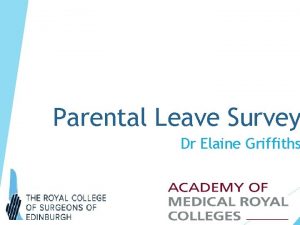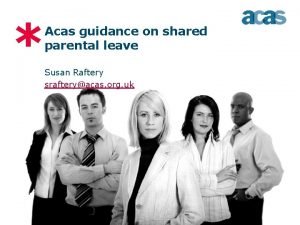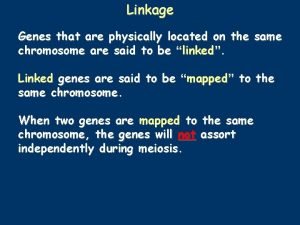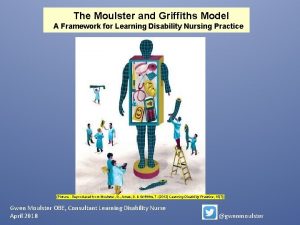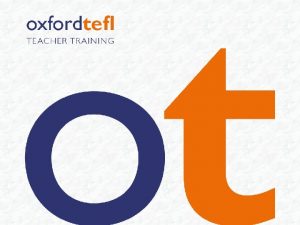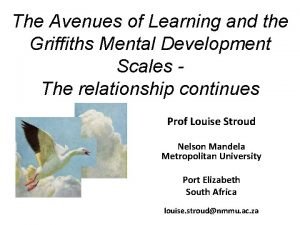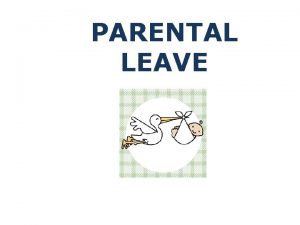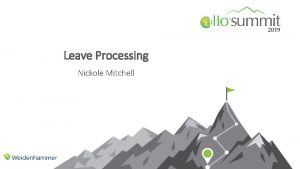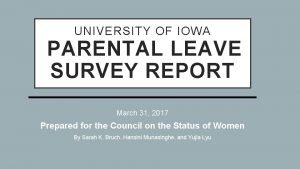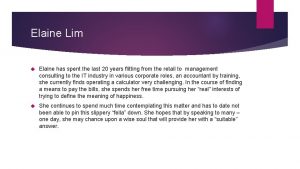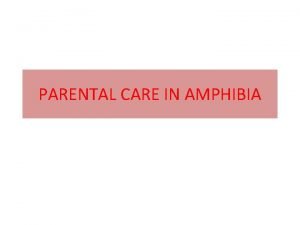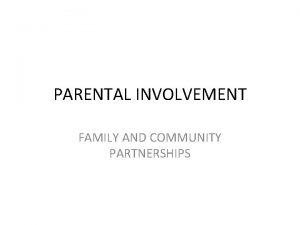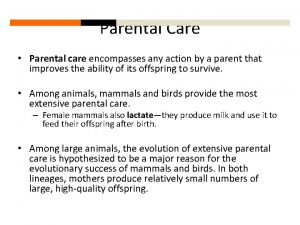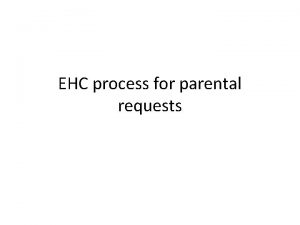Parental Leave Survey Dr Elaine Griffiths Parental Leave

















- Slides: 17

Parental Leave Survey Dr Elaine Griffiths

Parental Leave Survey � Total 1225 Responses aged between 31 - 50 yrs � All Specialities/LETB’s/Deaneries represented � 80% white British but all ethnic groups represented � Responses across all grades but specialist trainees the largest cohort � We have been able to subdivide the groups into those taking maternity leave >5 yrs ago & those taking maternity leave <5 yrs ago

Parental Leave Survey � All male respondents taking only 10 -14 days of paternity leave � No impact on their careers � Parental leave taken >5 yrs ago 13%; <5 yrs figure rose to 22% � Baseline for further studies

Parental Leave Survey Table: Grades Post 2010

Parental Leave Survey � Data suggest that the length of time taken for post-natal leave may be increasing Maternity leave duration post 2010

Parental Leave Survey � Data indicated poor knowledge of available resources to aid planning

Parental Leave Survey Prenatal concerns: � Effect on clinical competence 79% � CPD 57% � Revalidation 24% � Working relationships with colleagues 59% � Finances 74% � Childcare 78%

Parental Leave Survey Reasons for early return to work (post 2010)

Parental Leave Survey Emotional Concerns (Post 2010)

Parental Leave Survey � Less than 6% had Occupational Health Assessment or were aware of a risk assessment being performed on their return to work � Despite 25% were experiencing post natal problems � Sleep Deprivation results:

Parental Leave Survey Keeping in touch days (KIT) � Fewer than 50% discussed this option with their employers prior to maternity leave � Only 25% were actually offered KIT days � This figure dropped to 15% if the respondent was returning to a different Trust � Many were not offered the recommended 10 days:

Parental Leave Survey Facilitating a smooth return to work: � � � Only 20% offered opportunity to refresh/maintain clinical skills either during leave or after the return to work Nobody was offered a clinical attachment/shadowing prior to returning Only in Anaesthesia was any simulator experience to refresh resuscitation skills or the like given Only 5% were allocated a clinical supervisor/mentor to oversee their immediate return to work 75% were not informed of new policies or equipment changes which had occurred whilst they were on maternity leave Only 27% were provided with agreed milestones with, which to monitor their progress on returning to work, and information on how this was to monitored

Parental Leave Survey � 50% were breastfeeding on return to work � Only 8% were provided with a private space to express breast milk � This resulted in 30% ceasing breastfeeding earlier than planned � Other medical parents & partners were the most relied on resources when returning to work � Childcare was a major concern:

Parental Leave Survey � 80% of respondents were in full time work prior to taking maternity leave � 60% were planning to return less than full time � 1/3 of those who were returning less than full-time (LTFT) had difficulties arranging this � Considerable frustration was expressed about managing a LTFT return to work � Particularly the organisational paperwork, and the multiplicity of forms (as employer paperwork is distinct from that required by local education and training boards (LETBs)/deaneries)

Parental Leave Survey Overall Experience Rating:

Parental Leave Survey Action Points Remind Employers and colleagues of the importance of discussing voluntary arrangements around KIT days and ensure that the employees returning Trust if different is involved in these discussion � Colleges; LETB’s and Deaneries must be more proactive in promoting available resources to those seeking to take parental leave � Mandatory for Employers to inform all colleagues on maternity leave of new developments/equipment and direct them to appropriate resources to familiarise themselves with the advances � Encourage Employers to follow best practice ensuring that the first week of return to work is programmed as induction and shadowing a colleague to familiarising oneself with hospital procedures �

Parental Leave Survey Action Points � Risk assessments should be extended to include all mother’s returning from maternity leave � Deaneries/LETB’s must ensure that the returning trainee has a designated educational supervisor who will meet with them prior to returning to work and actively monitor their progress in the first three months � Returning Trainees must be given a designated consultant who will give them support and advice in the first three months
 Elaine griffiths
Elaine griffiths Acas paternity leave
Acas paternity leave Griffiths
Griffiths Griffiths 2015
Griffiths 2015 Blackboard sms
Blackboard sms Moulster and griffiths model
Moulster and griffiths model Mood gym
Mood gym Multipole expansion magnetic field
Multipole expansion magnetic field Gerhard fehringer
Gerhard fehringer Griffiths formula sheet
Griffiths formula sheet Griffiths valuation map
Griffiths valuation map Barney
Barney Griffiths
Griffiths Griffiths mental development scales
Griffiths mental development scales Electrodynamics
Electrodynamics Primary abcd
Primary abcd To buy a laptop computer elaine
To buy a laptop computer elaine Susan elaine rancourt
Susan elaine rancourt
